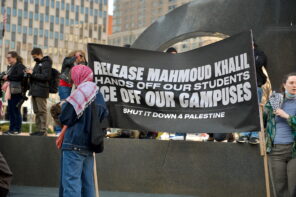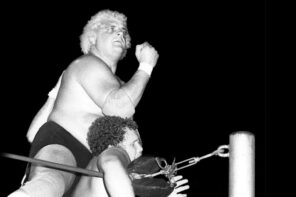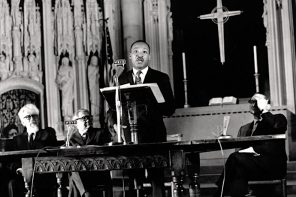We publish this story even as nuclear protesters are marching in Japan in response to an environmental and social crisis that has no certain end. – Eds.
On November 2, 2009, five Catholic activists — one nun, two priests, and two laypeople, all age sixty or above — cut through a series of chain link and barbed wire fences surrounding Naval Base Kitsap in Bangor, Washington, where roughly one-quarter of the United States’ nuclear warheads are reportedly stored and a fleet of eleven submarines equipped to deploy Trident nuclear weapons is stationed.
The five unfurled a banner reading “Trident: Illegal + Immoral,” poured their own blood over the site, and beat on the ground and the fences with household hammers before being apprehended and arrested. “We walk into the heart of darkness,” they wrote in a statement distributed to supporters and media, “as one step up the holy mountain where all nations can unite in peace” (read the group’s full statement here).
The five, who call themselves the Disarm Now Plowshares, were found guilty in December on four felony counts: trespass, damage to federal property, injury to federal property, and conspiracy to damage federal property. A week and a half ago in Tacoma’s federal court they received prison sentences of six to fifteen months, with an additional year of supervised release. The days surrounding their sentencing, during which supporters gathered in Tacoma for a “Festival of Hope,” highlighted the importance of legal consequences for this group of activists, and shed light on their aims.
Trespass, Blood, Hammers
The five activists (Bill Bichsel, 82, Susan Crane, 67, Lynne Greenwald, 61, Steve Kelly, 62, and Anne Montgomery, 84) performed a Plowshares action, part of a tradition that was started by priests Philip and Daniel Berrigan and others in 1980, in response to the perceived threat of nuclear holocaust and as a way to galvanize the Catholic Left following the Vietnam War era. With the aim of “enfleshing” Biblical calls to resist state power and warmaking, the Berrigans and six others, the Plowshares Eight, trespassed onto the General Electric Plant in King of Prussia, Pennsylvania, where four-foot-tall nose cones, for use with the then-new Mark 12A reentry vehicle system for the Minuteman III nuclear missile, had been manufactured by the GE Space Systems Division beginning in the 1970s.
In a creative response to the biblical injunction to beat swords into plowshares the eight activists hammered on the nose cones and poured their own blood, drawn beforehand and brought to the site in baby bottles, over the cones and around the room where they were kept. That “symbolic disarmament,” as Plowshares activists describe their deeds, has served as the model for about fifty similar actions in the United States since then (as well as related campaigns in a handful of other countries), most recently that of the Disarm Now Plowshares.
Like the Plowshares Eight, The Disarm Now Plowshares intended their act of civil disobedience — or “divine obedience,” as Plowshares activists prefer to call their actions — to function as symbolic disarmament, purifying the land and equipment from its sinful purpose; to draw attention to the danger of nuclear weapons (or “idols”); and to offer atonement, via the spilling of their own blood and the risking of their own freedom, for the sins of nuclear violence and idolatry. To ensure metaphysical efficacy, the action adhered to a ritual template that has remained strikingly consistent since the first Plowshares action — trespass, blood, hammers. But another crucial element of the Plowshares’ actions is the wait to be apprehended, which illuminates the ways in which the actions are meant to function.
Trial-as-referendum
The Plowshares Eight and the Disarm Now Plowshares were apprehended immediately. Several Plowshares groups over the years, though, have had to wait for some time to be noticed. Yet they do wait, because being arrested and going to trial are important components of the action, as was established in the weeks and months following the first action in 1980. Charged with burglary, criminal trespass, criminal conspiracy, simple and aggravated assault, terroristic threat, and seven other charges for their action at General Electric, the Plowshares Eight were given an offer: all charges would be dropped if they would simply go away, refraining from civil disobedience for six months. They refused the offer.
The result of their refusal was a legal process that would not be fully resolved until ten years later, when, after a series of appeals challenging the bias shown by the judge in the original trial, all were sentenced to time served of their eighteen-month to ten-year sentences. Plowshares activists in the United States have never been acquitted, though on occasion charges against them have been “inexplicably” dropped (not, however, when they have filed to have charges dismissed, as did the Disarm Now Plowshares, along with a few other groups of Plowshares activists over the years — these motions have been denied).
The near-certainty of a jury trial has come to be crucial to the Plowshares’ resistance, for several reasons. The trials provide an opportunity for more people to hear about the actions than would be likely to otherwise, and for the activists to convey their stance on nuclear weapons (to the extent that they are allowed to do so, at least, which is usually limited early in the legal proceedings). Plowshares activists hope, in the frustrated words of the prosecution’s response to the Disarm Now Plowshares’ motion for pre-trial permission to proceed with a defense based on international law and necessity (in which a criminal act is excused if it is undertaken as “necessary” to preventing a greater harm), “that they can turn their trial into what they perceive to be a referendum on United States defense strategy.” That motion was denied, as typically happens.
Even when the defendants are prevented from speaking about necessity and international law, though, in being arrested and tried the activists identify themselves with the figure of the prosecuted and persecuted Christ who is at the heart of their theology.
The Performance of Nonbelonging
The trials also give the Plowshares the opportunity to assert their identity in other ways, serving as an arena for the performance of nonbelonging, as the defendants flaunt what sociologist Erving Goffman called “situational propriety,” or the verbal and behavioral codes with which one signifies awareness of, respect for, and investment in a given social interaction.
Newspaper accounts of their trials describe episodes in which Plowshares defendants turn their backs on the judge, refuse to approach the bench, speak out of turn, or altogether decline participation in the trial. More subtle indications of situational impropriety can be deduced from trial transcripts in which judges becomes increasingly fed up with defendants’ slouching, eye-rolling — or, in one striking if somewhat baffling instance, “acting like hippopotami.”
Certainly there are many Plowshares defendants who do not flaunt the court’s situational propriety, but those who do are performing a sentiment shared even by those who display nothing but politesse: that their obligation is not to earthly justice, which in their view protects nuclear weapons, but to a more overarching, binding justice to which all are obligated, but to which very few choose to respond, because of the sacrifices entailed.
The trials thus allow the Plowshares to perform their identity as prophets and martyrs. That identity is decidedly authenticated by the prison sentences that most often result from their trials. Plowshares’ prison sentences usually fall in the one- to two-year range, though they also have been far longer.
In an anomalous case in 1985, eighteen-year sentences were handed down to activists who used, instead of household hammers, a jackhammer on a missile silo cover — which, they argued, even had it not malfunctioned and stopped working almost immediately, was every bit as ineffective against the covers as household hammers would have been—though they maintained that the appearance of greater destructive capability was indeed more symbolically powerful.
But even when the sentences are less extreme (the Disarm Now Plowshares’ sentences of six to fifteen months were half or less than half what had been expected, and far less than the possible maximum sentence of ten years), they serve to distinguish the Plowshares not only from the representatives of earthly justice, but even from their closest allies.
Prophets and Martyrs
The Plowshares are close kin, for example, to the Catholic Worker movement. Many Plowshares activists have lived in Catholic Worker communities, which provide crucial support for the Plowshares, as Sharon Erickson Nepstad has argued in her analysis of the Plowshares. But Rosalie Riegle Troester in 1993 and Erika Summers Effler in 2010 both reported, in their studies of Catholic Workers, that some Workers feel they don’t quite measure up to the high bar that the Plowshares set for Christian resistance, expressing regret that their circumstances don’t permit a jail sentence.
The correlation between risk and commitment means that within the Catholic resistance community, the Plowshares are virtuosi, a deeply-admired elite. The events surrounding their trials and sentencings (such as the Festival of Hope that took place in Tacoma last week), in which they and their “prophetic mission” are feted and celebrated, both reflect and shore up their status, not only as an elite, but as different from the wider activist milieu by virtue of their depth of commitment.
Perhaps most telling is the language with which supporters are being encouraged to support the Disarm Now Plowshares, post-sentencing. On the Disarm Now Plowshares blog, maintained by friends of the activists, a “See what you can do to support” link brings up the following message: “Besides our letters and good wishes, we can support Disarm Now Plowshares continuing our work to abolish Trident and all nuclear weapons. There are plenty of organizations working to do just that”.
A couple of suggestions — long-standing organizations and campaigns, especially in the Tacoma region — follow. The emphasis on getting involved with organizations and campaigns highlights the distinction between the Plowshares’ resistance and that of their supporters (most of whom are themselves involved in various peace and justice campaigns), and the special status of the Plowshares, in that the Plowshares’ form of resistance is marked precisely by the fact that it is not organizational in nature — not the result of recruitment or mobilization efforts or public awareness campaigns, but understood instead as the inspired act of a few individuals, moved to self-sacrifice by the dictates of conscience.
This is not to say that there are not organized networks that make their resistance possible. Indeed there are, and they came out in full force to support the Disarm Now Plowshares. It is the discourses and activities of those supporters — who, in comments on the DNP blog, call the Plowshares “heroes and heroines of nonviolence” and thank them for their “personal sacrifice” and their “courageous and prophetic efforts” — that highlight the distinctions between the Plowshares, and everyone else. These demarcations are important because it is in performing a witness that few will emulate that the Plowshares fully inhabit the roles of prophet and martyr, on which the potency of their actions depends.













